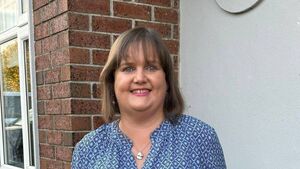Indomitable Laois woman is living life to the max despite having dealt with two brain tumours

Caroline Kane Montague
“A PERSON’S mental health and looking after it is key to dealing with physical illness,” said a woman who has dealt with two brain tumours and is keen to highlight how important social interaction can be.
Caroline Kane Montague, originally from Tramore, Co Waterford but who now has made Portlaoise her home, believes “it is important to talk to different people outside the world of sickness” to live life as normally as possible.
The 50-year-old, who was first diagnosed with a benign brain tumour at the young age of ten, explained what life was like for her when diagnosed in 1984.
Caroline is sharing her experience as part of National Brain Tumour Awareness Week, which runs from 21-27 October.
Latest figures from the National Cancer Registry from 2019 to 2021 show that approximately 800 people are diagnosed with a brain or other central nervous system (CNS) tumour each year in Ireland, including around 60 children and young people. The National Cancer Registry also notes that, in the period 2011-2020, brain and CNS tumours were the most common childhood cancer up to the age of 15 years, accounting for 27% of cancers, along with leukaemia, and the third-most common cancer in adolescents and young adults aged 16 to 24, accounting for 15% of cancers “I was in school. I was running out to the yard when I tripped and hit my head. I received a deep gash and so my mum was called to bring me to hospital. They had to put four stitches in and did a routine skull x-ray, which showed something was not quite right.
“The family GP was alerted and it was back to hospital to have a visual field test. This showed that I had no peripheral vision, which indicated something was not right at the back of my eyes,” said Caroline.
She was referred to a neurosurgeon in Cork, who told her and her family that she had a tumour – a craniopharyngioma – and that doctors needed to remove it as quickly as possible.
“My parents were told that three things could happen: I could be brain damaged, I might have a stroke and be left paralysed, or I might lose my sight,” said Caroline.
“Thankfully, none of these things happened, and while the tumour turned out to be benign, it had already damaged my pituitary gland, which produces stimulating hormones which are released to the major glands in the body responsible for many vital functions such as metabolism and growth.
“In retrospect, my mum recalls that when she would cut my nails or my hair that things weren’t growing back as quickly as for my siblings. I was also always bumping into things, tripping and falling, and cuts would take a while to heal.” The former Montessori teacher underwent surgery in July of that year. The surgical team did attempt to insert a shunt to drain fluid from her tumour, but this was rejected twice by her body and so it was decided to move forward without it. Caroline also experienced seizures when infection struck but, thankfully, these resolved with medication and life returned to her leaving school, studying working as a special needs assistant and eventually becoming a Montessori teacher.
All was well in May 2000 until she returned home from a trip to Boston. She went to bed for a nap that day and when she woke up could not see out of her right eye, and even scarier the following morning, when she had no vision in her other eye.
Caroline continued: “I went to hospital and an MRI confirmed the tumour was back. I underwent a number of craniotomies over the following year as the tumour kept growing back – these have left me with lots of titanium plates in my head as surgeons have had to remove so much bone. I even lost my sense of smell as a result and it hasn’t come back since. I also had to undergo radiotherapy.” Her tumour grew back a staggering five times over that period. But her family and friends were her support system and for Caroline she knows how lucky she is to have them.
For her, life is worth living and not allowing yourself to be on your own too much fighting isolation and knowing that it is good to have time to oneself also.
“I’m grateful for what I have and try not to fuss over small things. Having a brain tumour puts life in perspective. Before my operations in 2000-2001, I had been working as a Montessori assistant, so I decided to go back to college. I was very proud to attain a degree in Montessori teaching and a first-class distinction, particularly as concentrating and reading is so hard for me, not to mention having to deal with vision impairment, in not having peripheral vision,” added Caroline.
“I want people to know that everyone is different and, for me and many others, there is life after a brain tumour diagnosis. It drives me crackers in a soap opera when they kill someone off with a brain tumour. I would encourage people to join a support group and gain support from people who have been through it. The same goes for family members, for whom it is quite tough. The carers have to look after themselves, too.” For Caroline, it is the small things that matter most and the laughs she has shared with her family.
“I remember my father used to tease me, saying: ‘There’s nothing wrong with that brain of yours,’ when he saw how well I was doing with my studies and with quiz shows.
“My husband Julian, family and friends know that from over the years and by socialising and chatting to people, it helps me deal with life,” said Caroline, who recently joined a women’s shed.
Recently moved to Portlaoise, Caroline has been welcomed into the local community, for which she has pushed herself to become part of.
Caroline explained: “We only moved to Portlaoise a year ago and as I was at home on my own five days a week, as I'm no longer allowed to work due to a back injury, I was starting to feel down and depressed and my energy levels were low, as I wasn't getting out meeting people.
“I was flicking through Facebook one day and discovered that there was a wonderful women's shed which meets up every Friday morning at 10.30am down in the library in Portlaoise town. I joined it there a few weeks ago and it has opened up so many doors for me.
“The ladies were so nice and friendly and encouraged me to join a walking group on a Monday afternoon, a line-dancing class on a Tuesday morning, and chair yoga on a Thursday morning. I also joined the community choir in Portlaoise and I'm enjoying that immensely.” As a result, the plucky and determined woman already feels the benefits.
“I can already feel my mental and physical health improving. People's lives change when you are diagnosed with an illness and we must remember that we can make changes that can suit our new lives also. We may no longer be able to work due to our illness, so we need to find other things that keep us connected to people. Life can be drained out of you. The Portlaoise Women's Shed has been my life saver. Thank you, ladies!” Caroline is a member of the board of Brain Tumour Ireland. She works as a facilitator with its Cork support group and enjoys walking, going to concerts and line dancing, thanks in part to her new life in Portlaoise.
During National Brain Tumour Awareness Week, broadcaster and mental health advocate Keith Walsh will be the special guest at a forthcoming webinar organised by Brain Tumour Ireland that seeks to encourage carers of people with brain tumours to think about their own wellbeing as well as that of their loved ones.
The webinar, ‘Who cares for me? Challenging the carer to care for themselves too’, takes place on Tuesday 22 October 22 6pm. It aims to explore how stress can manifest itself as compassion fatigue and burnout, and what we can do to prevent this with some helpful self-care tips and advice. The event will be hosted by leading psychotherapist Bríd O’Meara.




